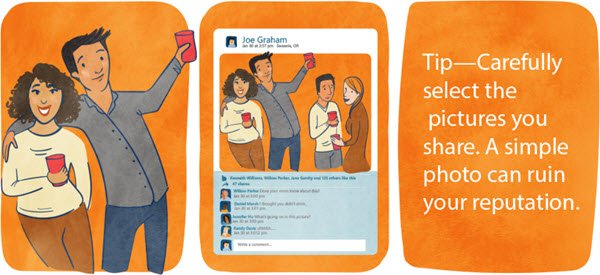This post offers some online safety tips, especially for kids, students, and teens, and can be used by anyone to see that he or she is not negatively affected while using the Internet.
Online Safety Tips for Kids, Students and Teens
A study shows that young people are more vulnerable to Identity thefts. It may be because they are more addicted to social networking sites and forums more than grown-up people and also because they have a fresh line of credit that can be exploited easily. Kids and teens are often the ones posting everything that comes to their minds and leave Digital Footprints around. Social networking sites make sharing easier and practically lure people into sharing everything, including things that should be private at any cost. Posts such as “I am alone at home”, or an image of driver’s license saying “I got a new car” sound innocent. They may seem innocent, but there are dangers of over-sharing on social media, and they could invite trouble as well. Before sharing anything to the social networking sites and public forums, see if you would feel like sharing that thing with others in real life. Think a little more – about the possible side effects of the post. If you post your driver’s license image, would you want just about anyone to read it? Will you show your driver’s license, for example, to strangers in life? If not, why are you sharing it with absolute strangers on Facebook? Of course, you wish to impress your friends, but there are others waiting for such information so that they can misuse it. Read: How to get your PC ready for online schooling and classes.
Identity Theft
Taking the driver’s license as an example, people can create a perfect copy of it using their own techniques once they have ample information. This is just a smaller example. Things can go as far as people taking loans in your name, based on your address and social security number as you shared them with others at some of the other points of time. The first and important tip for online safety for kids, teens, and even grown-up people is to take a moment before sharing anything and use it to reflect if they would be comfortable sharing it with strangers in real life. If not, why post it on the Internet where more than a billion strangers would see it. You do not want Identity Theft of any level to occur! Some social networking sites such as Facebook and Google Plus let you customize the visibility of posts to others. For example, if you change the post privacy from Public to Friends, your post is available only to your Facebook friends. Understand the social networking sites and public forums to see if such facilities exist and make use of them so that unknown people do not get to see your information. Read: What is Cyberbullying.
Online Reputation
The second tip is about maintaining your reputation online. Run an Internet Search with your name and its variations to see what all is visible in the search engine result pages. You should not post offending things about your teacher or boss or even a colleague over the Internet. Know that an innocent joke about your teacher, boss, colleague or anyone can come back to haunt your reputation when you apply for jobs or higher education. In the case of jobs, hiring managers are sure to run an Internet search to see what all information they can gather about you. If it shows anything weird, your chances become slimmer. To avoid such situations, try and don’t post any kind of offensive material on the Internet. In some cases, such offensive material may also have cops knocking at your door. Before anyone else sees the material, get it removed by either manually deleting it or asking the website administrator to remove it if you can’t do it on your own. Learn more about Online Reputation Management.
How secure is your Browsing
You would not want to give up your login credentials and bank information to people whom you do not know. If you are making a transaction, make sure the address of the site starts with “https” instead of just “HTTP“. Besides a lock icon, you should see a little description in green color on all browsers (except IE) in the address bar – towards the left. Never enter your login information and especially card etc. information in sites that do not show “https” in their URL. Never click links in the email as they may lead you to fake, cloned sites that look like the original website. Instead, type the website address in the address bar each time you wish to access those websites. You can bookmark them manually so that you can use them instead of typing the address in the future. Never ever click a link in the email even though it appears legitimate. There can be some exceptions, such as verification emails, sent by sites where you just asked for a password change or if you just signed up with some site. In most cases, such emails are received within seconds of taking some action such as requesting a password change or if you signed up with some website. You have to use your common sense in such cases. Identify phishing attacks, stay safe online & protect your personal information while browsing! Summary These are the basic tips for online safety for kids and teens: We hope this helps.
